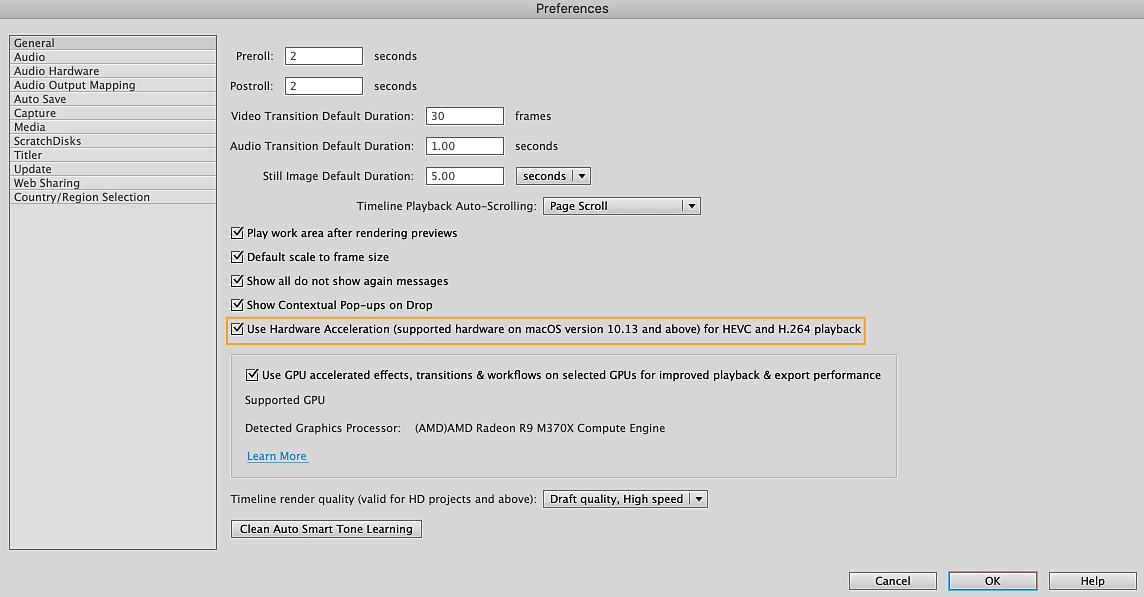This article provides insight into Mercury Playback Engine (GPU Accelerated) and Hardware Decoding/Encoding (Intel Media SDK) in Adobe Premiere Elements.
Mercury Playback Engine (GPU Accelerated) renderer
Adobe premiere elements can take advantage of available GPUs on your system to distribute the processing load between the CPU and the GPU to get better performance. Most of the processing is done by CPU and GPU assists in processing certain tasks and features. For a list of GPU supported effects and transitions, recommended graphic cards and all other information about GPU accelerated rendering, please click here.
Hardware-accelerated Encoding/Decoding (Intel Media SDK)
Intel® Media SDK is a technology by Intel® which utilizes the dedicated media processing capabilities of Intel® Graphics Technology to decode/encode fast, enabling the processor to complete other task and improve performance. Currently, this only supports encoding H.264, MPEG2 and MPEG4 codecs. This feature is only available if an Intel® CPU with Intel Media SDK support is used.
This option is enabled in PRE by default. To change settings, select Export and Share > Devices > Custom > Advance Settings. Under Encoding Settings, change the value of Performance to Software Encoding. Setting it to Software Encoding will disable hardware encoding and Adobe Premiere Elements won't use Intel Media SDK to encode the media (this may increase the rendering time).


While using Hardware Encoding you may see a higher GPU usage on the integrated Intel® GPU and not the dedicated GPU.
Why is the Hardware Encoding option unavailable?
If your system's BIOS supports enabling/disabling the Intel® GPU, ensure that it's always enabled for hardware encoding to work.
If you have a supported Intel® CPU with Intel® GPU enabled but can't utilise Hardware Encoding, ensure that the Intel® GPU is listed in the Performance tab of Task Manager (Windows® only). If the Intel® GPU isn't listed, check if it's enabled in the Device Manager and update the Intel® graphics drivers to the latest version.


Like Hardware-accelerated Encoding, Adobe Premiere Elements also supports Hardware-accelerated Decoding to provide better playback performance while working with the H.264/AVC, HEVC media in the timeline.
Adobe Premiere Elements may drop frames while playing back the sequence if intensive effects are added to the clips and the system is unable to process the frames in real-time
Steps to enable Hardware-accelerated Decoding:
- Navigate to Preferences > General.
- On macOS, enable the Use Hardware Acceleration for HEVC and H.264 playback checkbox. On Windows, HEVC Decoding is enabled by default.
- Restart Adobe Premiere Elements.


If the option is not active in the Preferences panel, it means that either the CPU doesn’t support Intel Media SDK or the Integrated GPU is not enabled or the Intel® graphics drivers may need an update.
Difference between Hardware-accelerated Decoding, Mercury Playback Engine (GPU Acceleration), and Hardware-accelerated Encoding
- Mercury Playback Engine (GPU Accelerated) is a renderer used to process GPU-accelerated effects and enhances playback.
- Hardware-accelerated Encoding is used to accelerate the encoding performance while exporting the timeline in H.264/MPEG2 and MPEG4 Codecs.
- Hardware-accelerated Decoding is a process which is used to accelerate decoding H.264/AVC and HEVC media while playing back the timeline.